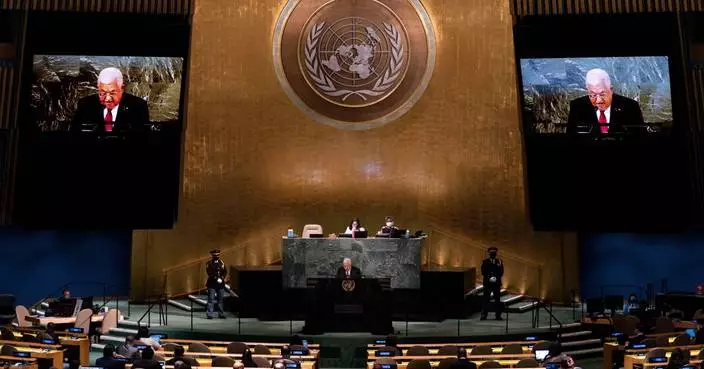A Soviet-born convicted felon who worked on real estate deals with President Donald Trump was accused in a lawsuit Monday of plotting to use Trump-branded skyscrapers to launder money allegedly stolen from a Kazakhstan bank.
BTA Bank and the City of Almaty, Kazakhstan, allege Felix Sater conspired with the son of the city's former mayor to use some of the $440 million to develop a Trump Tower in Moscow.
Sater, who was due to testify before Congress this week about his work with Trump, started pushing the Moscow project in 2005 and tried to kickstart it during Trump's 2016 presidential campaign, but it was never built.
The bank also alleges Sater helped the mayor's son, Ilyas Khrapunov, mask $3 million as down payments on three condominiums in Trump SoHo, a New York City hotel that Sater helped develop as an executive at Bayrock Group LLC.
Sater arranged for Trump and Khrapunov to meet and discuss potential investments, the lawsuit said, but it makes clear: there is no suggestion Trump engaged in impropriety or that he was aware Sater and Khrapunov allegedly stole money.
Messages were left with Sater and representatives for Trump and his company, the Trump Organization. Khrapunov is not named as a defendant in the lawsuit, filed in federal court in Manhattan. His lawyer noted that all claims against him regarding alleged money laundering have been dismissed by federal Courts in New York and California.
Sater's work on the Trump Tower Moscow project has made him a key figure in the House Democrats' investigations into Trump's ties to Russia. The Congressional probes are moving forward after Attorney General William Barr on Sunday said that Special Counsel Robert Mueller found no evidence that Trump colluded with Russia to influence the election.
Sater's public testimony, however, will wait.
The House Intelligence Committee postponed Sater's appearance, scheduled for Wednesday. It wasn't immediately clear if he would still meet with the House Judiciary Committee in a closed-door session Thursday.
Khrapunov's father-in-law, former BTA Bank chairman Mukhtar Ablyazov, is accused of embezzling billions of dollars from the bank and funneling the money into offshore entities. The lawsuit said that, once caught, he turned to Khrapunov to monetize and launder remaining assets.
Khrapunov knew Sater through his family and asked him to join the scheme in 2011, the lawsuit said. Sater had been involved in coal extraction and oil drilling ventures with Khrapunov's family and attended Khrapunov's 2007 wedding to Ablyazov's daughter, the lawsuit said.
Sater and two other people are named as defendants, along with five companies, including Bayrock. In addition to the money laundering allegations, Sater is accused in the lawsuit of stealing $40 million for himself and an associate.
Sater, 53, is among the more colorful characters in Trump's orbit. He served 15 months in jail in the early 1990s and permanently lost his stockbroker's license for stabbing a man in the face with the stem of a broken margarita glass at a Manhattan bar.
A few years later, he got caught in a $40 million pump-and-dump stock fraud, turned state's evidence against two New York crime families and then continued providing the government with information related to national security and other matters.
In another Trump connection, BTA Bank hired his former personal lawyer Michael Cohen in 2017 to help with litigation over Ablyazov's alleged embezzlement but dumped him within two months because it says he "did absolutely nothing of value." Sater and Cohen worked together on the Moscow project in 2016.
Follow Sisak at twitter.com/mikesisak
WASHINGTON (AP) — The Biden administration said Friday that Israel's use of U.S.-provided weapons in Gaza likely violated international humanitarian law but that wartime conditions prevented U.S. officials from determining that for certain in specific airstrikes.
The finding of “reasonable” evidence to conclude that the U.S. ally had breached international law protecting civilians in the way it conducted its war against Hamas was the strongest statement that the Biden administration has yet made on the matter. It was released in a summary of a report being delivered to Congress on Friday.
But the caveat that the administration wasn't able to link specific U.S. weapons to individual attacks by Israeli forces in Gaza could give the administration leeway in any future decision on whether to restrict provisions of offensive weapons to Israel.
The first-of-its-kind assessment, which was compelled by President Joe Biden’s fellow Democrats in Congress, comes after seven months of airstrikes, ground fighting and aid restrictions that have claimed the lives of nearly 35,000 Palestinians, mostly women and children.
While U.S. officials were unable to gather all the information they needed on specific strikes, the report said that given Israel's “significant reliance” on U.S.-made weapons, it was “reasonable to assess” that they had been used by Israel's security forces in instances “inconsistent” with its obligations under international humanitarian law “or with best practices for mitigating civilian harm.”
Israel’s military has the experience, technology and know-how to minimize harm to civilians, but “the results on the ground, including high levels of civilian casualties, raise substantial questions as to whether the IDF is using them effectively in all cases,” the report said.
International human rights groups and a review by an unofficial panel of former State and military officials, academic experts and others had pointed to more than a dozen Israeli airstrikes for which they said there were credible evidence of violations of the laws of war and humanitarian law. Targets included aid convoys, medical workers, hospitals, journalists, schools and refugee centers and other sites that have broad protection under international law.
They argued that the civilian death toll in many strikes in Gaza — such as an Oct. 31 strike on an apartment building reported to have killed 106 civilians — was disproportionate to the value of any military target.
Israel says it is following all U.S. and international law, that it investigates allegations of abuse by its security forces and that its campaign in Gaza is proportional to the existential threat it says is posed by Hamas.
Rep. Michael McCaul, the Republican chairman of the House Foreign Affairs Committee, said the review “only contributes to politically motivated anti-Israel sentiment” and should never have been done.
“Now is the time to stand with our ally Israel and ensure they have the tools they need,” he said in a statement.
But Sen. Chris Van Hollen, the Maryland Democrat who led the push in Congress, told reporters that even even though the administration had reached a general finding, “they’re ducking a determination on the hard cases. Politically inconvenient cases.”
The U.S. “treats the government of Israel as above the law,” Amanda Klasing of the Amnesty International USA rights group said in a statement.
Biden has tried to walk an ever-finer line in his support of Prime Minister Benjamin Netanyahu’s war against Hamas. The U.S. leader is a target of growing rancor at home and abroad over the soaring Palestinian death toll and the onset of famine, caused in large part by Israeli restrictions on the movement of food and aid into Gaza. Tensions have been heightened further in recent weeks by Netanyahu’s pledge to expand the Israeli military’s offensive in the crowded southern city of Rafah, despite Biden's adamant opposition.
Biden, in the closing months of a tough reelection campaign against Donald Trump, faces demands from many Democrats that he cut the flow of offensive weapons to Israel and denunciation from Republicans who accuse him of wavering on support for Israel at its time of need.
The Democratic administration took one of the first steps toward conditioning military aid to Israel in recent days when it paused a shipment of 3,500 bombs out of concern over Israel’s threatened offensive on Rafah, a southern city crowded with more than a million Palestinians, a senior administration official said.
The presidential directive that led to the review, agreed to in February, obligated the Defense and State departments to conduct “an assessment of any credible reports or allegations that such defense articles and, as appropriate, defense services, have been used in a manner not consistent with international law, including international humanitarian law.”
Nothing in the presidential directive would have triggered any cutoff of arms if the administration had more definitively ruled that Israel’s conduct had violated international law.
The agreement also obligated the State and Defense departments to tell Congress whether they deemed that Israel has acted to “arbitrarily to deny, restrict, or otherwise impede, directly or indirectly,” delivery of any U.S.-supported humanitarian aid into Gaza for starving civilians there.
On this question, the report cited “deep concerns” that Israel played a significant role in preventing adequate aid from reaching starving Palestinians. However, it said Israel had recently taken some positive steps, although still inadequate, and the U.S. government did not currently find Israel restricting aid deliveries in a way that violated U.S. law governing foreign militaries that receive U.S. military aid.
Van Hollen accused the administration of glossing over what he said were clear Israeli blocks on food and aid deliveries during much of the war. “That’s why we have hundreds of thousands of Palestinians that have nothing to do with Hamas on the verge of starvation,” he said.
Lawmakers and others who advocated for the review said Biden and previous American leaders have followed a double standard when enforcing U.S. laws governing how foreign militaries use U.S. support, an accusation the Biden administration denies.
Their opponents argued that a U.S. finding against Israel would weaken it at a time it is battling Hamas and other Iran-backed groups. It's not clear how much Friday's more in-between verdict would add to pressure on Biden to curb the flow of weapons and money to Israel’s military or further heighten tensions with Netanyahu’s hard-right government.
At the time the White House agreed to the review, it was working to head off moves from Democratic lawmakers and independent Sen. Bernie Sanders of Vermont to start restricting shipments of weapons to Israel.
Israel launched its offensive after an Oct. 7 assault into Israel, led by Hamas, killed about 1,200 people. Two-thirds of the Palestinians killed since then have been women and children, according to local health officials. U.S. and U.N. officials say Israeli restrictions on food shipments since Oct. 7 have brought on full-fledged famine in northern Gaza.
Human rights groups long have accused Israeli security forces of committing abuses against Palestinians and have accused Israeli leaders of failing to hold those responsible to account. In January, in a case brought by South Africa, the top U.N. court ordered Israel to do all it could to prevent death, destruction and any acts of genocide in Gaza, but the panel stopped short of ordering an end to the military offensive.
Biden in December said “indiscriminate bombing” was costing Israel international backing. After Israeli forces targeted and killed seven aid workers from the World Central Kitchen in April, the Biden administration for the first time signaled it might cut military aid to Israel if it didn’t change its handling of the war and humanitarian aid.
Presidents Ronald Reagan and George H.W. Bush, in the 1980s and early 1990s, were the last presidents to openly hold back weapons or military financing to try to push Israel to change its actions in the region or toward Palestinians.
—-
Zeke Miller and Mike Balsamo contributed.

Palestinians mourn their relatives killed in the Israeli bombardment of the Gaza Strip, at a hospital in Rafah, Gaza, Friday, May 10, 2024. (AP Photo/Ismael Abu Dayyah)

U.S. President Joe Biden boards Marine One at Moffett Airfield in Mountain View, Calif., Thursday, May 9, 2024. (Jose Carlos Fajardo/Pool Photo via AP)











